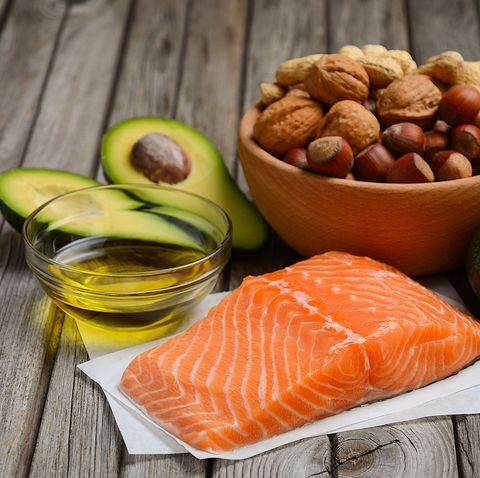
This article was reviewed by Eric Klett, M.D., endocrinologist and associate professor of medicine and nutrition at the University of North Carolina at Chapel Hill, on November 19, 2018.
If you’ve ever seen a commercial for a diabetes drug, you’ve probably heard the term ketoacidosis thrown around as a potential “scary side effect.” (If not, just turn on cable at 2 a.m.—you’ll find one.)
Well, keto dieters may note that the term actually sounds a lot like ketosis—in which a low-carb diet helps your body burn fat instead of carbs for weight loss.
In fact, they sound crazy similar. So…are ketosis and ketoacidosis linked at all, or are their similarities just an unfortunate spelling coincidence?
All right, what is ketosis again?
Ketosis typically occurs when you’re eating very few carbs, like on the super-popular keto diet. (Think: 60 to 75 percent of your calories from fat, 15 to 30 percent from protein, and five to 10 percent from carbs.)
When your carb intake is that low, your body can’t burn glucose (a.k.a the sugar from carbs) for energy like it normally would. So instead, it burns fat for energy, a process that then releases ketones as a byproduct, says Eric Klett, M.D. an endocrinologist and associate professor of medicine and nutrition at the University of North Carolina at Chapel Hill. (This process explains why people on the keto diet see such crazy weight-loss results.)

While, yes, ketosis can have a number of effects on your body (especially if you’re newly adjusting to it) like keto breath or diarrhea, going into ketosis on the keto diet is generally considered normal and safe.
So…what is ketoacidosis then?
Ketoacidosis typically only occurs in people with untreated type 1 diabetes, according to Klett. And yes, it’s very dangerous.
When a type 1 diabetic doesn’t have adequate insulin to drive glucose utilization, they will start burning fat in excess and over-producing ketones in a way that goes way beyond fat-burning.
A little background: When someone has type 1 diabetes, their immune system attacks and destroys the cells in the pancreas that make insulin (hence why diabetics have very low insulin levels), per the National Institute of Diabetes and Digestive and Kidney Diseases (NIDDK).
Insulin is important because it helps your body convert the glucose (mostly from the carbs you eat) in your blood into energy in your cells, per the NIDDK. But people with type 1 diabetes don’t produce enough insulin for this to happen naturally.
Now, if a diabetic is taking daily insulin injections that pretty much solves the problem. If not, all hell breaks loose.
If a diabetic’s insulin levels drop very low, they produce ketones at a pretty fast rate—and all those ketones make a diabetic’s blood super-acidic, which eventually affects their organs. Plus, because of their insulin deficiency, diabetics actually produce ketones at a much faster rate than an average, healthy person on the keto diet ever could.
If someone experiencing diabetic ketoacidosis (DKA) doesn’t inject themselves with the insulin they need, and get hooked up to an IV ASAP, their chances of death are super high—like within-24-hours high, says Klett.

Luckily, DKA has some pretty glaring signs, so someone experiencing it can get help ASAP—symptoms include rapid and heavy breathing, having to pee a lot, and thirst that can’t be quenched, says Klett. As things progress, they’ll also “get confused, become delirious, and eventually have cardiovascular collapse because the blood pH gets so low,” and their organs will stop functioning properly. So again, treatment is necessary.
So… are ketosis and ketoacidosis connected at all?
Yeah, but loosely. Both involve the body being in a ketotic state, but one’s totally normal and the other’s when ketosis goes too far (again, in those with type 1 diabetes) and gets pretty scary.
It’s possible for your keto diet, for example, to lead to ketoacidosis, but that would be extremely uncommon. (Again, because you’re not eating an “absolutely zero carb” diet and because, as an average person, you can retain their insulin levels better than a diabetic and not over-produce ketones.)
But that doesn’t mean it could never, ever happen—in fact, it actually did happen to one women on a “no-carbohydrate” diet, according to a 2006 case report in the New England Journal of Medicine. According to the case report, the woman was on a strict low-carb regimen for four years (she ate fewer than 20 grams of carbs a day—20 grams per day is the minimum on the keto diet, but most people eat 50 grams per day), but her ketoacidosis cleared up after she was put on a diet with normal carbohydrate intake.
Of course, all of this also begs the question as to whether someone with diabetes can do the keto diet—and according to Klett, they can…as long as they’re taking their insulin injections, it shouldn’t be a problem, he says.
Source: Read Full Article
